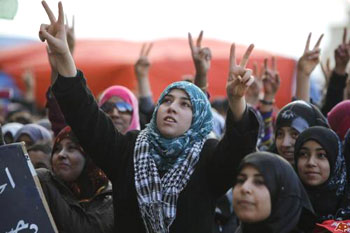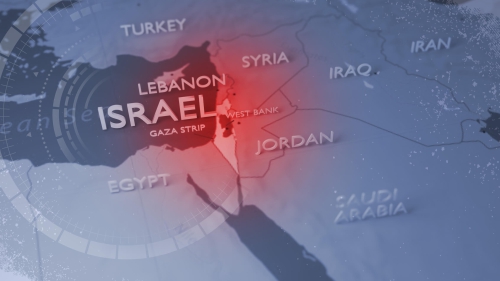Irresolute Middle East and Oil: Uncertainty Looms
 |
The early 2011 saw many things changing abruptly and no one saw this coming! Greece plunged into major debt crisis, European Unions' survival together raised some eyebrows, America saw their economy crumbling down despite major cash injections and the U.A.E had to reshape their financial systems overnight , just to name a few. However what made it to the headlines of each and every news broadcasting channel and newspaper was the Political Unrest that engulfed the Middle East and North Africa (MENA) region. What started off from a young university student lighting himself up on fire in front of a government building in Tunisia trying to express himself against the hostilities and oppression that the hoi polloi of his country were facing, caused a major stir in the entire world.
Soon enough magazines and news channels had slides and breaking news running all over them about uprisings in Egypt, Libya, Algeria, Bahrain and Syria. Local Governments and Human Right Agencies had to gear up for the bombardment of questions that would be coming at them because of these events that they were able to have hands-on information about the realities on ground as a result of 3G mobile technology and Streaming Internet Media. Videos and podcasts from the revolts and clashes were being put-up on the internet sites and being shared amongst millions users globally.
Since the uprisings were gaining momentum, the developed countries had to gear up to bear the price of all this. If the Middle East is surrounded with war and unrest, logically all of this will lead towards expensive oil which will mean price hikes in nearly everything. We have known for quite sometime now that oil markets are very sensitive animals that are prone to overreacting but take some time to heal. Oil traders can be termed as lenders who are best able to control these flocks when supplies are stable and predictable, but the Middle East right now doesn't seem to be going towards stability, at least for some time to come. The equation is simple, like water is to fish, the Middle East is to oil. Here we can analyze certain categories in the light of our topic.
- Iran: In a state of desperation & threatening to shut down Strait of Hormuz
- Libya, Syria & Yemen: Future still hangs in limbo
- Risk of High Oil Prices
The idea of blocking the Strait of Hormuz came up once Iran was successful in capturing an American Spy plane that had breached Iran's air space. Americans termed it as a Malfunctioning of the aircraft where as Iran thinks otherwise. As a result of this Parviz Savari, a well know Parliamentarian said that the country was planning to close down the Strait of Hormuz that exists between Oman and Iran. This is currently being patrolled by American aircraft carriers providing safe passage to sea traffic. Soon after this comment made it to the media, a senior Revolutionary Guards Commander backtracked explaining that Iran had no intentions of closing the Strait as Iran relies heavily on trade taking place through the area mostly to the U.A.E and if it was to happen it will bring the country to a standstill. 60 percent of Iran's economy is driven from oil exports to countries like China, Japan, India and some European countries. Spain, Italy and Greece are the top customers from Europe that buy Crude Oil from Iran but they might halt this trade if EU puts up more severe sanctions on Iran. The intend to do so if Iran is found supporting Bashar Assad's violent crackdown on the civilians of Syria whom is responsible for killing around 8,000 innocent people in a short span of time.
Iran's state of desperation is also another concern for the international community. Undoubtedly this country is running short of allies as Syria is under a brutal crackdown. Hamas, having to receive their 10 percent of budget from Iran earlier, in the form of ammunition, is now more open to the weaponry market, as Libya and Egypt are more likely to support them against Israel. Lebanon still supports Iran being another Shi'ite majority country but it has concerns of its own, with masses of refugees entering the country especially from Syria, Jordan and Palestine that make up its Sunni minority block. American and other western powers are already pressing hard on countries that have trade links to Iran and are being subjected to more sanctions if linked with Iran in any form of transaction.
As for Libya that recently got independent from the Dictator Muammar Gaddafi, things still do not look that good. Having ageing oil fields and lack of infrastructure especially after the NATO attacks on oil refineries, the country still needs time to stand back on its feet and indulge in the Oil market trade. Already there are developments that have been initiated by the caretaking government to revamp the oil fields from drilling, extraction and so forth. As they are well aware that Oil fields earn them good foreign exchange and vitalize the economy.
Syria as we have discussed earlier still hangs in the balance. Bashar Assad's call for cease fire and allowing the international agencies to fly-in to Syria and assess the situation has not won him enough support. Being an old ally of Iran has earned Syria some severe punishments like being ousted from the Arab League and not allowed to hold talks with any of the GCC countries for a resolution. All of this has resultantly opened doors for further sanctions over Syria that might hit the country's financial system leaving it with no better or wiser options. More locals prefer to withdraw their savings and convert them to more reliable and stable currencies like US Dollar or UK Pounds pushing the Central Syrian Bank to come up with more policies to regulate excessive cash influxes that they are facing. Officials are pessimistic about any abrupt betterment in the lending as well, since more people will default on their payments and banks will tighten policies to lend more to anyone. These sanctions will hugely limit trading activities and Trade Finance will also take a hit. The only resolution that the International community is praying for as well as the people of the country is that Bashar Assad steps down and gives up his state of power and authority like the the dictators in Egypt and Tunisia.
Yemen, after Abdullah Saleh's departure seems to be holding on well. This country has witnessed deaths of innocent people, mass protests, political out lashes and clashes between protestors demanding a change with military forces, trying to keep the superiors in power. Even though Ali Abdulla Saleh signed an accord of handing over power to the caretaking government, one important thing to be noticed is that he will still be in charge of the Republican Guards who in turn are his loyalists and are led by his very son. Looking on the brighter side, the caretaking government once again has promised its people and the international community better results and a bright future for the people of the country.
If we move towards the conclusion, we will find that high oil prices have landed oil companies with record levels of earnings for some time now. OPEC has pushed its combined oil output to the maximum since 2008 as a result of a possible threat of military action against Iran. Riyadh can expect a hefty windfall in the coming years especially as the geopolitical tensions in the region and abroad escalate. Traders as of now are interested in the upside of prices; geopolitical risks between the Gulf countries and North Africa; Chinese crude oil demand; Growth in US economy and Euro zone debt crisis. If all of the above are taken out of the equation, oil prices will nose dive big time!
Iran's threat to shut down strait of Hormuz will see a major outcry from the international markets as it is the world's most important checkpoint for oil supplies. If the Strait is shut down as a result of excessive embargos on Iran, the price of oil/barrel will shoot up to $300 per barrel. Keeping in mind that Iranian oil cannot be replaced by Russian Ural Crude even though they are of similar quality, reason being Ural's price already shooting up over Bent Crude. After a news agency mistakenly reported the Strait of Hormuz as closed, Crude oil prices leapt by almost $101 per barrel, which later on stabilized.
Expensive oil is more detrimental to the entire global economy. Americas and EU are going through a lean patch and unprecedented debt problems, while their economies are drowning, expensive oil will be the last nail in the coffin to send the global economy spiraling down into recession. The economy might take a long time to come back to normal after such a recession. Saudi Arabia has been churning 9.8 million barrels/day just till last month (March-April, 2012). Saudi Aramco has out rightly dismissed any plans to produce more oil even if demand increases.
Oil output has been stalling but oil prices have shot up enough to cover the wounds of major Oil Companies. Exxon for example had profits jump over by 41% in Q3 of 2011 for being able to sell oil to USA for $96 per barrel. Shell another oil giant doubled its earnings to $7.3 billion. Chevron pulled in a decent $6.3 billion and the list goes on. It is pretty evident that oil companies are producing significantly less but charging more due to high demand which they know will never decrease, looking at the current political and security scenario especially in the MENA region. As per certain research companies the oil demand will surge by 1.5% annually. Iran is already producing 4.3 million barrels/day (2010) which constitutes about 5% of the world's oil production. Once again countries like China, Korea and Iran will keep on buying from the country whereas international pressure will keep on mounting in the form of sanctions and detachment of possible allies, if any.
The Middle East is far away from being predictable and stable as is seen right now. One word from Iranian politicians can send futures markets up by a percent in hours. Islamic Brotherhoods' victory in Egypt and their alliance with the Salafi block will have oil traders lying awake at nights with worst case scenarios running through their heads. Foreign ministers throughout the world are praying for Sunnis and Shiites to somehow miraculously find peace in Syria, as no apparent solution can be seen. The world as we see it now is at precarious crossroads right now and a wrong turn could easily trigger a sectarian and nationalist violence that will be followed by global competition for scarce and shockingly expensive oil.
Bibliography
1. Casey Research Energy Team. "A battle for oil production is brewing". Gulf Financial Insider, January 2012, 26-27.
2. KBC Consulting. "New Libya- New Problems". Oil Review Middle East, March-April 2012, 14-15.
3. Gulf Insider. "Iran's growing state of desperation". Gulf Financial Insider, April 2012, 24-25.
4. The Gulf. "Taking a calculated risk on high oil". The Gulf, 36-37.
*****
Shahariyar Yousuf is freelance writer, he lives in Kingdom of Bahrain.
















